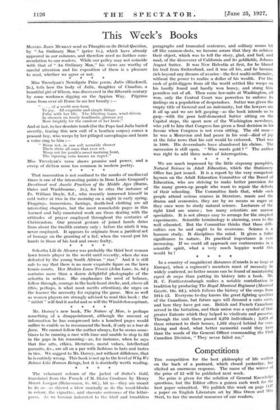Miss Trevelyan's Newdigate Prize poem, Julia (Blackwell, 2s.), tells how
the body of Julia, daughter of Claudius, a beautiful girl of fifteen, was discovered in the fifteenth century by some workmen digging on the Appian Way. Pilgrims came from over all Rome to see her beauty :—
at . of a world new-born
To joy. All exquisite and simple things Pulse with her life. The blinding foam, wind-driven In showers on lonely headlands, glistens yet More brightly for the candour of her brow."
And at last, to her desolate tomb (for the Pope had Julia buried secretly, fearing this new cult of a heathen corpse) comes a peasant boy, who weeps by her pillaged sarcophagus and hears a voice sing to him :-
"Weep not, in one soft noontide shower There shine all suns that ever set. Weep not for youth's sweet morning hour, The ripening corn knows no regret."
Miss Trevelyan's verse shows promise and power, and a sweep of diction none too common in modern poetry.
* * * *














































 Previous page
Previous page